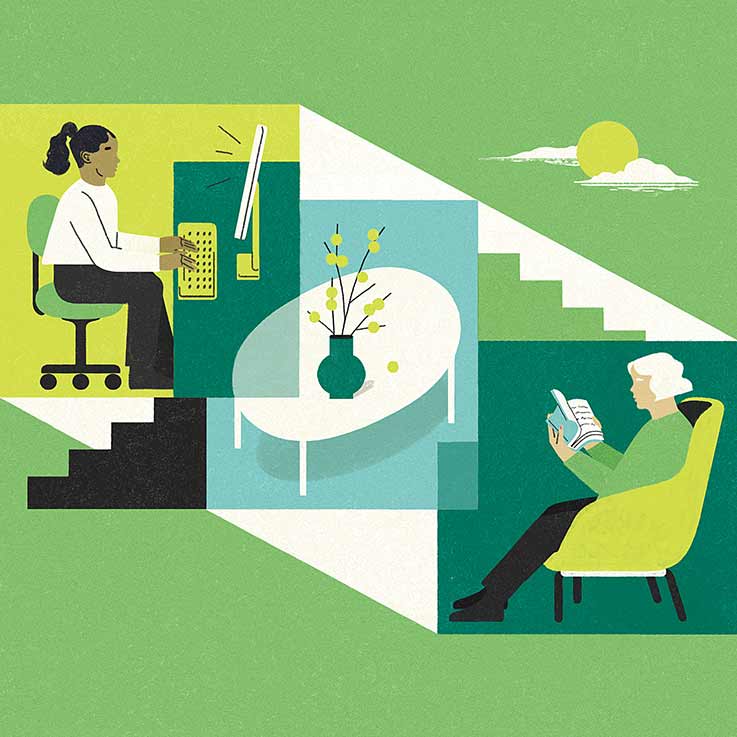
Whose Knowledge Is It?
Whose Knowledge Is It?
Community-centered approaches to research in practice at Simon Fraser University.
By Shawn Smith, Stuart R. Poyntz, Am Johal, Dara Kelly & Stephen Dooley Aug. 24, 2020
(Illustration by iStock/Evgeny Gromov)
Many communities rightly tire of researchers who want to study their ways of being, their problems, and their knowledge, without building reciprocal relationships for mutual benefit. They often experience research as extractive, using their time and energy to “create knowledge” (knowledge that has always resided with them) and locking it in academic journals. This can be particularly true for communities facing social, economic, and environmental challenges where social innovation may hope to have something to offer.
Community-engaged research (CER) explores ways to redesign this relationship, to center community priorities and leadership, and to ensure that the results are of mutual value. We believe dedicated infrastructure is needed to support this transition and to overcome barriers to the success of CER. Existing leaders in the field include Rutgers’ Collaborative Centre for Community-Based Research, Brown’s Swearer Centre, and networks like Community-Based Research Canada. Simon Fraser University (SFU) shares a history of community engaged scholarship and recently launched the Community-Engaged Research initiative (CERi) to extend and cement the University’s commitment to ethically-centered relationships with external partners.
From Where We Come
Innovating Higher Education for the Greater GoodThis series, presented in collaboration with Ashoka U, will share insights from leaders in higher education, presenting stories, strategies, and lessons in rewiring higher education’s purpose, relevance, and business models.FOLLOW THIS SERIES
At the broadest level, CER is a critical approach to knowledge generation where theory and academic knowledge are woven to and incorporated with the world in collaboration with communities in order to understand, analyze, and reimagine the conditions governing our lives. It involves the active participation of those directly affected and presumes joint responsibility for design, execution, and outcomes. Community members bring crucial contextual information and expertise, and their central involvement helps ensure findings have mutual relevance and utility.
Community leadership and participation in research has a long tradition across the humanities as well as the social and natural sciences. CER is also a dynamic force among social change initiatives including citizen-based budgeting, constitutional forums and social innovation labs that co-create knowledge with those directly impacted. Despite this history and potential many barriers hinder CER in institutional contexts. Areas identified for focus include training, recognition, funding, the language of research, ethics frameworks and processes, community-university power dynamics, and tenure and promotion protocols.
The Community-Engaged Research Initiative
Responding to this context and following a year-long study with faculty, staff, and students, SFU launched CERi in 2020 to support, lead, and mobilize CER while contributing to the broader field. CERi is a university-wide research infrastructure with support from the Office of the President and the Vice President Research, and links to research ethics, graduate student and early career faculty training, and community-engaged units and researchers. CERi provides SFU scholars, students, staff, and community members flexible research space, a community scholars program, a researchers-in-residence program, funding, learning resources and media production facilities. CERi also offers a community of practice, leads policy-centered projects on issues like CER recognition in Tenure and Promotion and supports new collaborations.
CERi’s work draws on a robust institutional history and practice of engaged research at SFU. A series of current projects highlight the deeply community-centered approaches to knowledge creation and application that continue to flourish at the University, including:
1. 'Our Community, Our Voice': Active Community Engagement Model
In community-engaged research, how the project is completed is as important as the results. Our Community, Our Voice (OCOV) was a 2015 study of the needs of refugees in Surrey, British Columbia (BC)—a city receiving up to 40 percent of the refugees in BC—which would form the basis for the City of Surrey’s formal refugee settlement planning. OCOV utilized the Active Community Engagement Model (ACEM) for deep community involvement in research, a model designed around a community steering committee, the hiring and training of community research assistants to develop and deliver all aspects of the process, and a Community Planning Day (CPD) where community members develop recommendations grounded in early research results. When the community is directly involved in making recommendations, the resulting ideas are more likely to be implemented successfully.
A 22-person community committee met eight times and informed all aspects of project design and delivery. Seven youth who had recently arrived as refugees from Myanmar, Somalia, Iraq, and El Salvador helped lead participant recruitment and conversations, language translation, and facilitation of the CPD. Research assistants all reported new confidence, skills, and opportunities through the project, and community can truly be said to have co-created the full process and outcomes.
2. Adapting Research Methodologies With Indigenous Communities
Because universities have participated in historical and ongoing colonial relations, researchers seeking to contribute to decolonization must consider the unique contexts and ways of knowing of the communities they engage, as a matter of efficacy and social justice. To collaborate with Indigenous communities means re-assessing assumptions about how knowledge is generated and by whom, who has access, and what mechanisms merit legitimacy for its distribution.
At SFU’s Beedie School of Business, Indigenous business theory is a burgeoning field of research. Empirical data grounded in the voices, histories, and ancient institutional contexts of place reflect research engagement beyond cursory commitments to communities. This research involves accessing Indigenous knowledge where we are situated—the unceded lands of the Coast Salish peoples—and understanding and applying these philosophies.
At the heart of Indigenous research methodologies are Indigenous ways of being grounded in identity, sense of place (spatial orientation), and intergenerational responsibility (temporal orientation). Research that makes these aspects visible tends to draw from inductive, qualitative approaches such as in-depth interviews or focus groups that facilitate dialogue and relational knowledge sharing. This requires unique skills, training, and experience. A methodological example is the ability to understand Indigenous ways of being and knowing, as it happens. The researcher must distinguish nuanced moments when Indigenous knowledge presents itself, even if it is rarely declared explicitly by interviewees. Capturing layers of what is said, and seeing what is really being said, requires a researcher who can discern through patient listening and awareness of deep context. These moments have a profound impact on processes and outcomes.
Reflecting broader challenges to the success of CER, publishing findings drawn from Indigenous research methodologies can be difficult. Validity and reliability within Indigenous knowledge systems are usually measured through collective verification. For example, in an interview process the way Elders know knowledge to be accurate is tied to verification of same by other elders. However, for research ethics, interviews may need to be conducted in private, which presents a tension between Indigenous research methodologies (and the ways Indigenous knowledge is passed down) and traditional expectations within the academy for external verification of knowledge.
3. RADIUS SFU: Community-Centered Social Innovation Labs
Also based at SFU Beedie, RADIUS runs social innovation labs and education programs that bridge community and university. Specialized staff identify opportunities for collaborative systems-change initiatives with community stakeholders, before working to design and launch a community-centered social innovation lab. Each lab lasts multiple years and combines: i) systems research; ii) solutions experimentation; iii) community capacity building; and, iv) knowledge mobilization.
For example, from 2014-2018, the Local Economic Development Lab (LEDlab) focused on building a more inclusive economy in Vancouver’s Downtown Eastside. This community has many strengths but faces significant challenges related to poverty, and has had many concerns about “being studied” based on past extractive experiences with researchers. The LEDlab team therefore spent a year building relationships, asking if the work was welcome and how to be useful. In the end, the lab incubated 11 new ventures, offered 290 hours of strategic support to 60 civic stakeholders, provided 1006 hours of training, conducted two policy projects, and left a new coordinating mechanism in place. It also created 30 graduate student internships and knowledge products supporting policy, venture models and new lab methods and replication efforts.
More recently, The Refugee Livelihood Lab has worked since 2018 to shift systemic barriers for racialized migrant communities, building on relationships created in the OCOV project in Surrey, BC. This lab similarly spent significant time assessing need, community support, and appropriate design. Staff, advisors, and participants have lived experience as refugees, service providers, policy-makers and advocates. In the first 18 months, newcomer innovators have created 23 ventures, convened hundreds of community members and identified several systemic barriers to refugee success. Sample projects include pop-up marketplaces, board games to navigate cultural identities, hackathons connecting employers to refugee tech talent, and programs building migrant leadership in settlement systems.
What RADIUS learns in its labs is shared widely through diverse knowledge mobilization efforts (including a collaboration with CERi), as well as woven back into applied teaching programs like SFU Change Lab through shared research, overlapping program advisors and staff, presentations, and events.
Reflections and Lessons Learned
When done well, this work can change us. This can be disorienting and it is easy to revert to comfortable ways of working. But in support of building this field and authentically rooting CER in reciprocal community relationships, we offer the following practical advice for those who want their community-centered research journey to transform the work they do, going forward:
- Relationships come first. Truly reciprocal research processes are based in trust and mutual understanding, which takes time and consistency.
- Researchers need training, practice and experience to do CER well.
- The process is as important as the outcome. Done well, we are inevitably exposed to and surprised by the assumptions we hold in re-assessing our processes.
- “Engaged” is not a box to be ticked. Community must help shape and drive the process. Results need to be mutually accessible and valuable to them.
- Hire and support project leaders who defend community priorities and question university-community power dynamics.
- Representation and leadership matter. This for example means prioritizing BIPOC project leadership with BIPOC communities.
- Traditional research cultures will not change easily. Systems self-perpetuate. Dedicated resources and infrastructures can help develop exemplars, build communities of practice and create new narratives and focus for needed process and policy changes.
We must ask harder questions about how we work and the resulting impact. Our opportunity and challenge is to fundamentally re-examine research cultures, assumptions, and incentives, while creating real, enduring infrastructure that can build new strengths while eliminating barriers to CER in our institutions.
Whether centering newcomer voices in research that impacts their well-being, shaping research methods in a good way with Indigenous partners, or building research and innovation programs around community objectives from the start, we are reminded that there can be “nothing about us without us.” The knowledge we are trying to “create” often already resides with impacted communities, and our approach must respect this. Communities are right to question the value of anything less.










